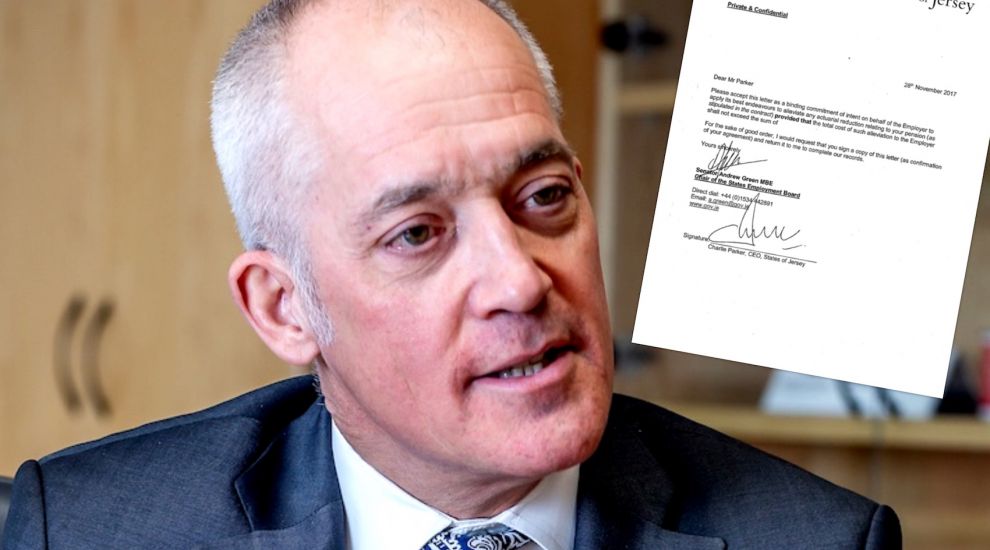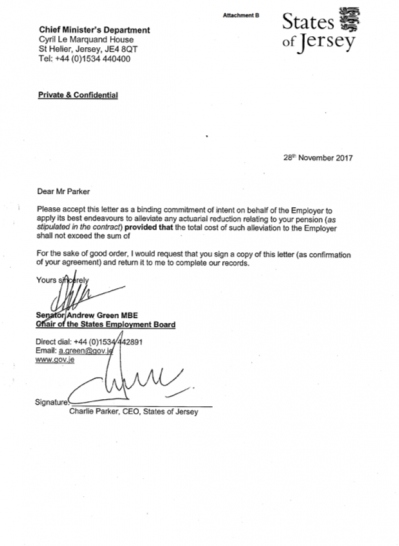


The Government is refusing to reveal how much it agreed to ‘top up’ the former CEO’s pension upon his early retirement.
Normally, pension benefits accessed before normal pension age are reduced due to the longer period of payment. However, the Government took the unusual step in 2017 of agreeing that, should Charlie Parker want to step down before he was 66 years and four months old, they would do their best to cover this loss.
The controversial perk, which caused a stir among States Employment Board (SEB) members at the time, was negotiated and confirmed in a ‘side letter’ accompanying Charlie Parker’s contract.
Its existence only emerged following the storm over his £500,000 departure pay-out, which the Government’s spending watchdog said following a probe last month she believed to be “in excess of his maximum entitlement under his contract of employment and associated side letter”.
Express requested the side letter under the Freedom of Information Law to shed more light on the divisive sweetener.
The letter was released in line with the request at 19:55 on Friday – but with the crucial sum redacted. The Government said this was because it was “personal” information. Express will be appealing this redaction.
It read: “Please accept this letter as a binding commitment of intent on behalf of the Employer to apply its best endeavours to alleviate any actuarial reduction relating to your pension (as stipulated in the contract) provided that the total cost of such alleviation to the Employer shall not exceed the sum of [REDACTED].”

It was signed by Senator Andrew Green MBE, who at the time was Chair of the States Employment Board, and Charlie Parker on 28 November – two days before he signed his contract.
It remains unclear how much of Mr Parker’s £500,000 pay-out, which followed his agreement to step down in the wake of the row over his second job, was a ‘golden handshake’ and how much related to ‘topping up’ his pension.
In a report on Mr Parker’s termination arrangements, Comptroller and Auditor General Lynn Pamment confirmed that if the amount of money needed to alleviate the pension reduction for early drawing was less than the cap specified in the ‘side letter’, “only such lower amount would be payable.”
She was also clear that the clause “does not provide a right for any increase in pension benefits in the event of early retirement”.
Ms Pamment said that the clause would be triggered in any situation in which the Chief Executive chose to retire before reaching pension age – not just if there was “mutual agreement” that he should leave his job early.
She described the pension perk as a “matter of debate” by the SEB before Mr Parker’s contract was agreed, adding that, in the original draft contract of employment, the was no cap on how much taxpayer money would be used to ‘top up’ Mr Parker’s pension if necessary.
The cap was added later due to concerns “about the potential liability faced if the former Chief Executive transferred other pension benefits to PEPS [the Public Employees Pension Scheme, ed.].”
Minutes of a crisis SEB meeting held to decide how much Mr Parker should be paid off said the panel of politicians was “prepared to offer the minimum contractual entitlement to Mr Parker”, and believed this to be £500,000.
However, this was actually the “maximum” entitlement if there were a particular set of circumstances – the C&AG said these circumstances “did not exist” when the compromise agreement was signed.
Despite her review finding that Mr Parker’s settlement did not match up with what was agreed under his contract, she said that the sum itself was “not unreasonable” in light of the legal battle the Government may have otherwise faced.
The ‘unusual’ payment led the Government to receive what was believed to be the first ever qualified sign-off of their Annual Report and Accounts from auditors.
The Public Accounts Committee – a panel of politicians responsible for examining how taxpayers’ money is spent – is currently reviewing the controversial payment as part of its wider scrutiny of the Government’s 2020 Accounts.
In a PAC hearing earlier this month, Interim Chief Executive Paul Martin confirmed that a closer eye was now being kept on contracts.
Comments
Comments on this story express the views of the commentator only, not Bailiwick Publishing. We are unable to guarantee the accuracy of any of those comments.